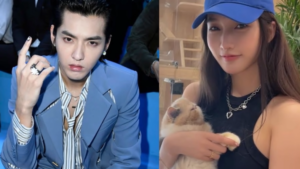Kris Wu, Kris Who: A Glance at Online Rape Culture
Kris Wu, Chinese-Canadian singer/actor/producer, pleaded guilty of sexual allegations. A pop star used social media to prey on underage girls.
The whole case peaked when one of the victims Miss Du, Meizhu released a long Weibo post on 18th July, 2020 accusing Kris Wu, once a superstar, of drugging, seducing and harassing, after the incident had brewed online for months. Audiences were astonished that a man of dreams turned out to be a cunning liar and habitual criminal. Meanwhile, we also notice that young ladies could be such an easy quarry of men, and the Internet may worsen it.

Boyfriend
First, the huge gap between stage and backstage is startling. Viewers may understand that celebrities may not as perfect as shown on social media because people at work are somehow different from them in personal life. Even so, Kris Wu was still an eye-opener. To be specific, his talent for music, film performance and even good manners are mostly fabricated by his producers, editors and public relationship team.
Instead of getting indulged in the performance, he is utterly aware of the fake act (Goffman, 1990, p.28), and the corresponding benefits. He is despicable enough to locate emotionally immature and vulnerable subjects through social media such as Weibo (similar to Twitter) and Tantan (similar to Tinder), because their profiles are just accessible and even detailed on the webpage. Meanwhile, he weaved his front into women’s expectations, revealing himself as lonely, harmless and even sensitive Prince Charming. It is precisely the “consistency between appearance and manner” the audience hope to validate (Goffman, 1990, p.35). Adults may be fooled, let alone teenage girls.
What Do You Mean
Second, gender inequality is aggravated. Does patriarchy still exist in the 21st century? Sadly, it does when the vulnerable might be exploited even more. Miss Du was at least deluded by 3 different sides. At first, Kris Wu (30) promised her a serious relationship and a leading role in a music video to “rationalise” the harassment. Then Mr. Xu (31), a registered sex offender and the online content contributor who helped her edit the post, labelled Du as a liar but himself a hero saving a damsel in distress. What’s more, Mr. Liu (23), an Internet fraud, attempted to swindle the compensation fee (2 million RMB, or £ 231,556) out of Miss Du. At this stage, we did not yet include the misdoing from Wu’s staff members as pimps, or cyberviolence from Wu’s irrational fans.
Those in a position of power still abuse the power.
Have things changed? Not really. Those in a position of power still abuse the power. Men with some resources lure the less advantaged groups with opportunities. Young ladies may lack money, connections and key information (most importantly!), so as to walk into a trap without realizing it. Wu is just among the “participants utilizing dramaturgical strategies in order to achieve their objectives of causal sex with hot girls” (Anahita, 2020, p.183). To some point, he is worse because he aimed only at weak targets in glittering camouflage.
Miss Du has to face more than lies right after turning 18. Going public as a rape victim or rape survivor is still regarded mortifying, which is also known as victim blaming or slut-shaming. Females should look sexually desirable without potentially ruining their reputation (Richard and Couchot-Schiex, 2020, p.27). If not, you are not a perfect victim so that some fanatical trolls online may say “You deserve that because you have selfish motivations of fame or money”. Since when, victims need disciplines rather than perpetrators?
I'll Show You
However, we still have hope because #MeToo is happening. Thanks to Du’s bravery and resilience, other victims stood out and more people have paid attention. Over 20 young girls who received similar “invitations” from Wu and his staff posted screenshots of WeChat and Weibo conversations, to unmask the performer, to make a stance and to unite.
More and more netizens reposted with related hashtags on social media, out of empathy, “outrange at the pervasiveness of rape culture”, “a desire to challenge rape myths that deny recognition for many victims”, and “a sense of generating communities of care” (Mendes and Ringrose, 2019, p.48).
Anyway, justice was done when Kris Wu was arrested under criminal charges and the scammer (Liu) for fraud, the liar (Xu) was expelled from the Internet, although Miss Du is still owed an apology. The society is getting better and women can make a difference.
Notes:
I used Justin Bieber's song names as subheadings, because it occurred to me that he and Kris Wu have a lot in common, who are both Canadian musicians, young and rich, and once involved in scandals and complicated romantic relationships. However, Kris Wu is talentless and irresponsible. This is me talking about the case in Chinese on my personal channel: https://www.bilibili.com/video/BV1GP4y147Ua/
References:
Anahita, S. 2020. The Drama of Predatory Heteromasculinity Online In: D. N. Farris, D. R. Compton and A. P. Herrera, eds. Gender, Sexuality and Race in the Digital Age [Online]. Cham: Springer International Publishing, pp.171–185. [Accessed 7 November 2021]. Available from: http://link.springer.com/10.1007/978-3-030-29855-5_10.
Goffman, E. 1990. The presentation of self in everyday life 1. Anchor Books ed., rev. ed. New York: Anchor Books.
Mendes, K. and Ringrose, J. 2019. Digital Feminist Activism: #MeToo and the Everyday Experiences of Challenging Rape Culture In: B. Fileborn and R. Loney-Howes, eds. #MeToo and the Politics of Social Change [Online]. Cham: Springer International Publishing, pp.37–51. [Accessed 7 November 2021]. Available from: http://link.springer.com/10.1007/978-3-030-15213-0_3.
Richard, G. and Couchot-Schiex, S. 2020. Cybersexism: How Gender and Sexuality Are at Play in Cyberspace In: D. N. Farris, D. R. Compton and A. P. Herrera, eds. Gender, Sexuality and Race in the Digital Age [Online]. Cham: Springer International Publishing, pp.17–30. [Accessed 7 November 2021]. Available from: http://link.springer.com/10.1007/978-3-030-29855-5_2.
Zeng, J. 2019. You Say #MeToo, I Say #MiTu: China’s Online Campaigns Against Sexual Abuse In: B. Fileborn and R. Loney-Howes, eds. #MeToo and the Politics of Social Change [Online]. Cham: Springer International Publishing, pp.71–83. [Accessed 7 November 2021]. Available from: http://link.springer.com/10.1007/978-3-030-15213-0_5.
Related links:
News reports:
https://www.theguardian.com/world/2021/aug/16/pop-star-kris-wu-arrested-beijing-suspicion-rape
https://www.theguardian.com/world/2021/aug/06/kris-wu-arrest-raises-hopes-for-chinas-metoo-movement
User-generated Content (video, Chinese):
https://www.bilibili.com/video/BV1R54y1E74a?spm_id_from=333.999.0.0
https://www.bilibili.com/video/BV1FU4y1H7p3?spm_id_from=333.999.0.0

